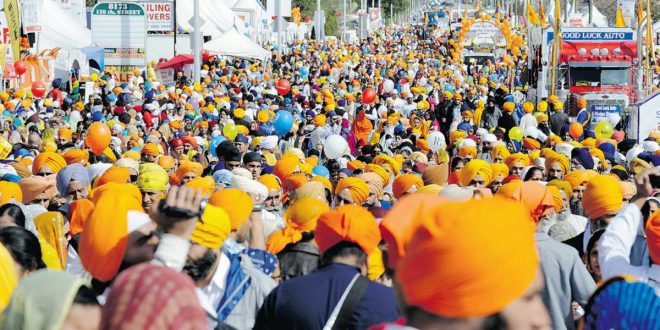By Dr Balbir Kaur Gurm
This Vaisakhi, Let’s try to communicate values of Sikhi, not just our food and dresses.
Vaisakhi is the day that the Khalsa panth was created by Guru Gobind Singh Ji on April 13, 1699. He saw the numerous injustices being done by the Mogul empires including higher taxes, burning down places of worship and forced conversion. Guru Ji decided that he needed brave volunteers who were willing to give up their lives for social justice and equity.
Most Sikhs know the story of Guru Ji asking for one volunteer at a time, taking them into a tent and coming out with a sword dripping with blood. The five people who volunteered to give up their life for the values of social justice were all given amrit (water and sugar cakes specially prepared by running the sword through them) to drink as Guru Ji recited hymns from the Adi Granth Sahib and gave them all the name Singh.
Then he asked that they (the panj pyare) perform the same ceremony on him. This marked the birth of the Khalsa. The Khalsa was provided a dress code (Five Ks) to provide an identity. He instructed that the Khalsa should have long unshorn hair (kesh), a comb (kanga), and wear: shorts type underwear (kachera), a steel bangle (kara) and a sword (kirpan). Guru Ji wanted all the common folks to be proud of who they were and become united to fight, so he gave them this uniform. The Khalsa Panth was an army created to fight the atrocities of the Mogul empire and to create a social and just community as opposed to thechaos and oppression at the time.
Today Vaisakhi is celebrated in Canada with huge parades that draw thousands of people. Vaisakhi is birth of the Khalsa but it occurred during the time of the harvest festival, so both are celebrated together. It is wonderful that there is a huge turnout at the parades (nagar kirtans) where vegetarian food is served. There are multiple stages with entertainment and speakers. Additionally there are many hymns being sung from the Sikh scriptures (Guru Granth Sahib) during the parade. The music is mystical and calming.
The message of the Sikh, baptized or not, is one of equity and Sikhs as a community have been working hard to promote equality in British Columbia and demonstrate the teachings of Sikhi. For example, Sikhs are to work hard and earn an honest living and help whoever they can (this was definitely the case of the early settlers from Punjab who came to British Columbia and formed the Khalsa Diwan Society that helped all settlers who came, not just Sikhs).
Sikhs are to donate 10 percent of their wages for the common good, to give back and also to have the funds to fight for justice. Our community has been very generous, for example raising a substantial amount of money for Surrey Memorial Hospital’s new Emergency Department, Guru Nanak Emergency Services.
It may, also, make sense for some Sikhs but especially the Khalsas (baptized Sikhs) to join the Canadian armed services or thepolice because the Khlasa was created to fight injustices. Also, it may make sense to become lawyers because today, human rights cases are fought in the courts. Sikhi, as well, is about social activismand peaceful protests against violations.
This Vaisakhi, I encourage the community to think about how we can continue to demonstrate the values of Sikhi through community work, volunteer projects, and fighting against unfairness. For example, in Canada we have the Canadian Human Rights Act, which has similar values to Sikhi. It is important for Sikhs to speak up and try to ensure that the act is practiced, and that there is no discrimination.
The purpose of this Act is to extend the laws in Canada to give effect, within the purview of matters coming within the legislative authority of Parliament, to the principle that all individuals should have an opportunity equal with other individuals to make for themselves the lives that they are able and wish to have and to have their needs accommodated, consistent with their duties and obligations as members of society, without being hindered in or prevented from doing so by discriminatory practices based on race, national or ethnic origin, colour, religion, age, sex, sexual orientation, gender identity or expression, marital status, family status, genetic characteristics, disability or conviction for an offence for which a pardon has been granted or in respect of which a record suspension has been ordered. (http://laws-lois.justice.gc.ca/eng/acts/h-6/page-1.html#h-2)
Although, we have the Human Rights Act, the practice is not always consistent with the written act. According to the Human Rights Watch World Report (2018) the Canadian government still needs to deal with “rights of Indigenous peoples, including violations of their right to safe drinking water and police abuse of Indigenous women. Canada also grapples with serious human rights issues relating to detention, including the placement of children in immigration detention.” The full report can be found at https://www.hrw.org/world-report/2018/country-chapters/canada. Even in a democracy, we still have not been able to achieve equal rights for everyone!
As we walk in parades and eat fabulous food, let us try to be kind, caring and honest people. Let us build on the teachings of Guru Gobind Singh Ji and continue to work towards an equitable society free from injustices.
Let’s try to communicate our values and not just our food and dress. Tell at least one person the values of Sikhi and make a commitment to engage in at least one action this year to create a community where everyone is equal and there is no discrimination. Vaisakhi is about action, it is time to act!
Dr. Gurm is a community leader/activist, professor of nursing at KPU and the volunteer facilitator/chair for NEVR (www.kpu.ca/nevr)
 Desi Today Magazine
Desi Today Magazine




